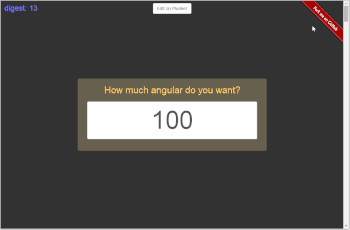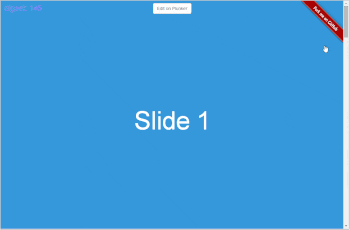Scroll-aware AngularJS with ease.
- Pure AngularJS, no dependencies
- style and class directives with scrolling locals
- Supports multiple stages
- Triggers scope digest only when needed
- Of course it utilizes requestAnimationFrame
Scroll them to see the effects!
- How much angular do you want? (
sw-classwithng-repeat) - Lovely slides (
sw-broadcast) - Two controls on the shield (
sw-stage)
Check out the example directory for a full list of examples.
AngularJS 1.2+
Include the angular-scroll-watch module with AngularJS script in your page.
<script src="//ajax.googleapis.com/ajax/libs/angularjs/1.3.3/angular.min.js"></script>
<script src="http://pc035860.github.io/angular-scroll-watch/build/angular-scroll-watch.min.js"></script>Add pc035860.scrollWatch to your app module's dependency.
angular.module('myApp', ['pc035860.scrollWatch']);bower install angular-scroll-watchnpm install angular-scroll-watchType: expression
Base directive to specify a scroll-watch configuration. Required for any watching activity.
scroll-watch should be used at least one of these directives: sw-style, sw-class, sw-broadcast to take effect, since itself is just a configuration directive.
<div scroll-watch="{from: 0, to: 1000}"
sw-style="{backgroundColor: 'rgba(0, 0, 0, '+ 1 * $progress +')'}">
</div>| Name | Type | Description | Required |
|---|---|---|---|
| from | Number | Watch-range starting point. Can be a positive or a negative (calculated from bottom to top) value. Note that from's visual value (scrollTop) must be higher than to. |
Yes |
| to | Number | Watch-range starting point. Can be a positive or a negative (calculated from bottom to top) value. Note that to's visual value (scrollTop) musts be lower than from. |
Yes |
| stage | String | Specify the stage name to watch for scrolling. Stages are defined via sw-stage. If no stage is specified, default to browser window. |
No |
| digestSync | Boolean | Normally, scroll-watch only reevaluate watchs on scroll event fired. Setting digestSync to true will force scroll-watch to do the reevaluation everytime the binded scope gets digested. |
No |
Type: expression
Provides basically the same function with built-in ng-style.
sw-style gets reevaluated when the target stage firse scroll event or the scope it belongs to get digested (available with digestSync option set to true).
There are couple of locals available in the expression. See Locals section for more information.
<div scroll-watch="{from: 0, to: -1}"
sw-style="{backgroundColor: 'rgba(0, 0, 0, '+ 1 * $progress +')'}">
</div>Type: expression
Provides basically the same function with built-in ng-class. All the animation goodies added after AngularJS 1.2 are also supported.
sw-class gets reevaluated when the target stage fires scroll event or the scope it belongs to get digested (available with digestSync option set to true).
There are couple of locals available in the expression. See Locals section for more information.
<div scroll-watch="{from: 0, to: -1}"
sw-class="{
p20 : $percentage > 20,
p40 : $percentage > 40,
p80 : $percentage > 80,
p100: $percentage >= 100
}">
</div>Type: expression
$broadcast(or $emit) certain event when specified condition expression result changes from false to true or from true to false.
Note that conditions must be written as String rather than Expression.
<div scroll-watch="{from: 0, to: -1}"
sw-broadcast="{
'slide1': '$percentage < 20'
}">
</div>By default, all the events $broadcast(or $emit) by sw-broadcast will be inside the digest loop. From time to time, you might need the event to be $broadcast(or $emit) on every stage scroll. Setting the condition to true will do the work, and no longer trigger the scope digest due to performance consideration.
<div scroll-watch="{from: 0, to: -1}"
sw-broadcast="{
'keep firing': true
}">
</div>We then receive the event with $scope.$on.
$scope.$on('event name', function ($evt, active, locals) {
/**
* active
*
* The evaluation result of the condition.
* Will be `null` when used with "keep firing" events.
*/
/**
* locals
*
* See the Locals section for more information.
*/
});To cover various use cases, sw-broadcast comes with serveral special options. They are all optional.
| Name | Type | Description |
|---|---|---|
| $rootScope | Boolean | $broadcast(or $emit) the event from $rootScope. Default to false. |
| $emit | Boolean | Use $emit instead of $broadcast. Default to false. |
<div scroll-watch="{from: 0, to: -1}"
sw-broadcast="{
$emit: true,
'slide1': '$percentage < 20'
}">
</div>Type: string (interpolation-ready)
sw-stage let you specify the scrolling element (the container) to watch with a customized name.
A default stage named pc035860 (Ya!!), which is the browser window, will always be presented. (And will be used if you don't specify the stage option in scroll-watch.)
Basically there's no restriction on the DOM structure of scroll-watch and sw-stage, even the directive creation order doesn't matter.
<div scroll-watch="{from: 0, to: -1, stage: 'speed control'}"
sw-broadcast="{
$rootScope: true,
'speedChange': true
}">
</div>
<div class="speed-control" sw-stage="speed control" title="speed control">
<div class="speed-control__height"></div>
</div>Locals here means a set of locally available variables inside our sw-style, sw-class, sw-broadcast expressions, which can be very useful when we're implmenting various effects.
Their values depend on which stage your expression is watching (specified in scroll-watch's stage) and where you're scroll-watch located in DOM.
All locals are presented as Number.
| Name | Description |
|---|---|
| $positive | Scrolled value in pixel. |
| $negative | Scrolled value in pixel, but calculated from the stage bottom. This is a negative number. |
| $progress | Scrolling progress. Ranged from 0 to 1. |
| $percentage | Scrolling progress presented in percentage. Ranged from 0 to 100. |
| $direction | Scrolling direction. 1 means from top to bottom. -1 means from bottom to top. |
| $height | The watcher(scroll-watch) element's DOM height. |
| $offsetTop | The watcher(scroll-watch) element's overall top value. |
| $stageTop | The watcher(scroll-watch) element's relative top value to the stage. This value is only presented when the watcher is a children of its stage. |
Thie module uses gulp.js for development tasks.
Install all the required node packages.
# Install node packages
npm install# Lint the source file
gulp lint
# Build
gulp build
# Watch the source file for auto-build
gulp watch
# Serve the example at http://localhost:9000
# Gulp will also watch for source/example changes
gulp example
